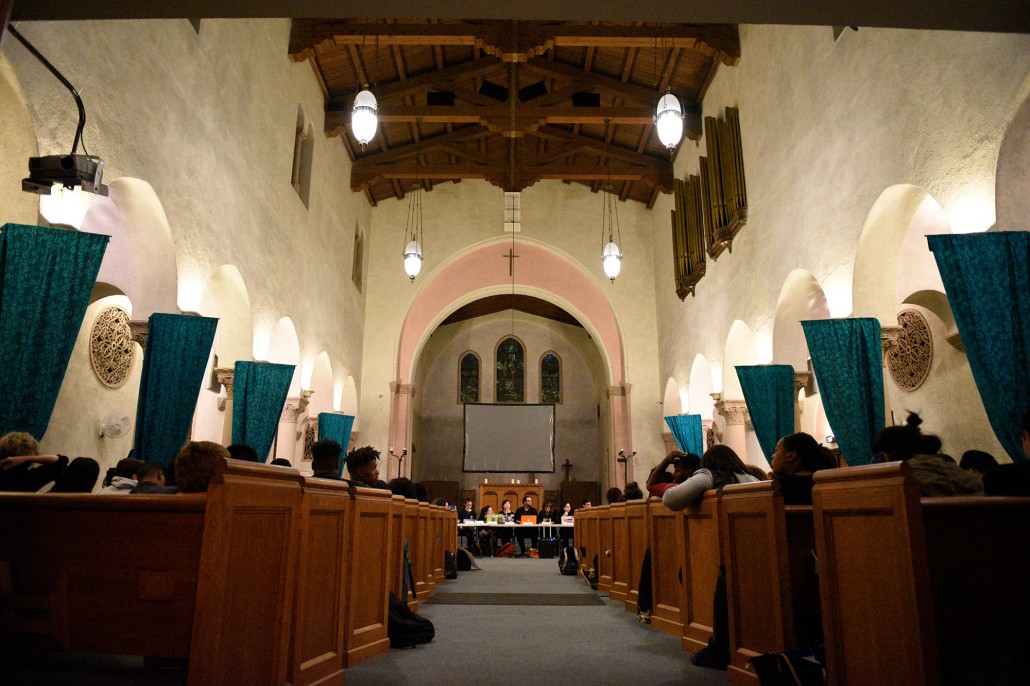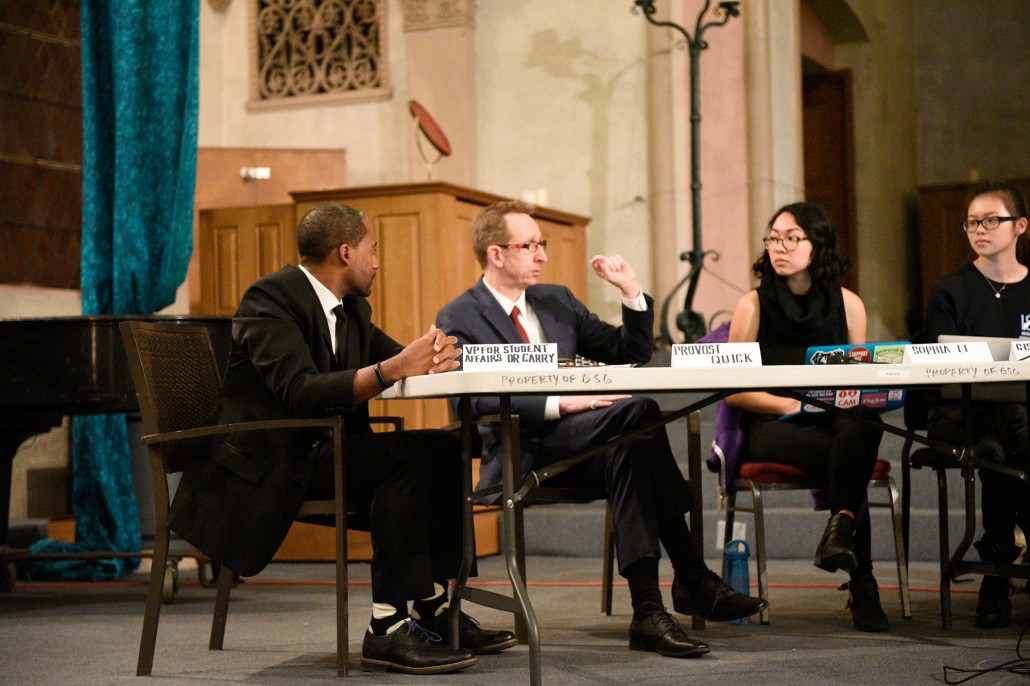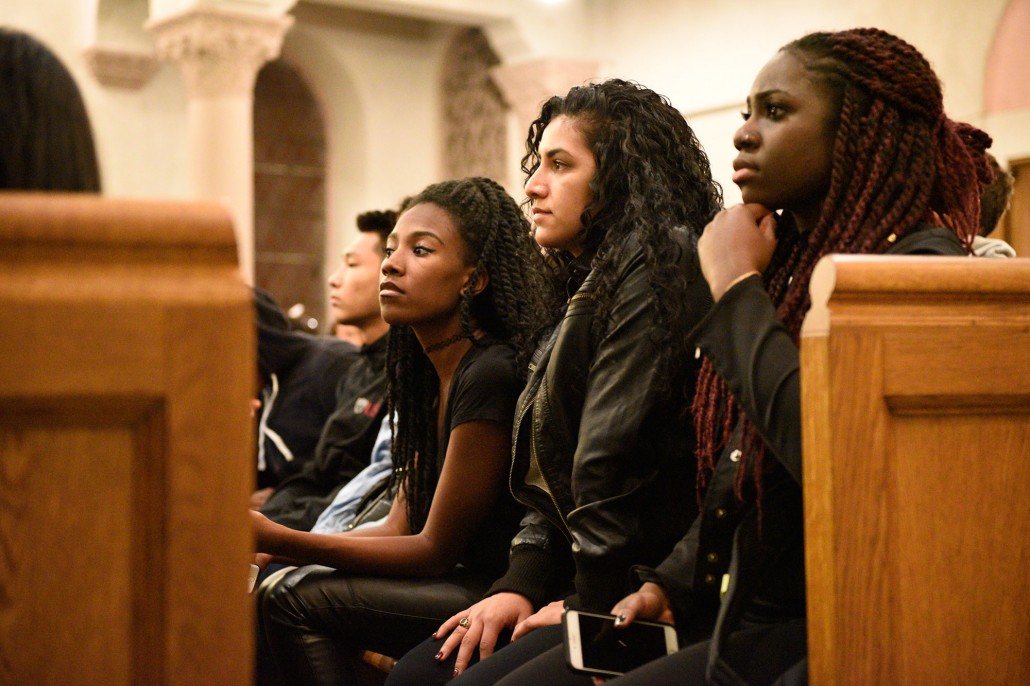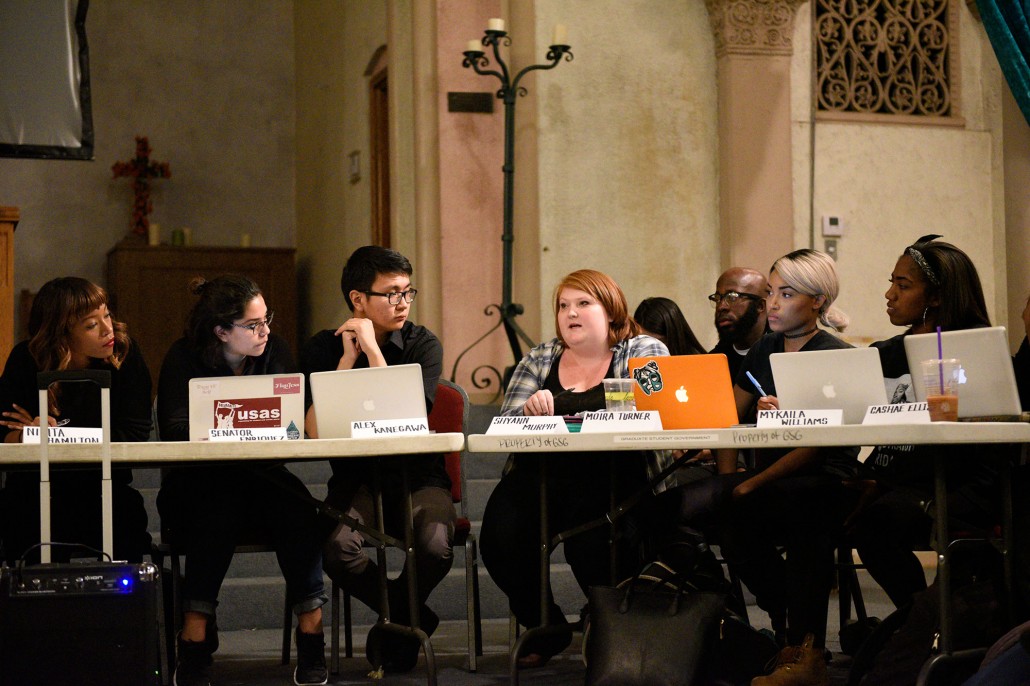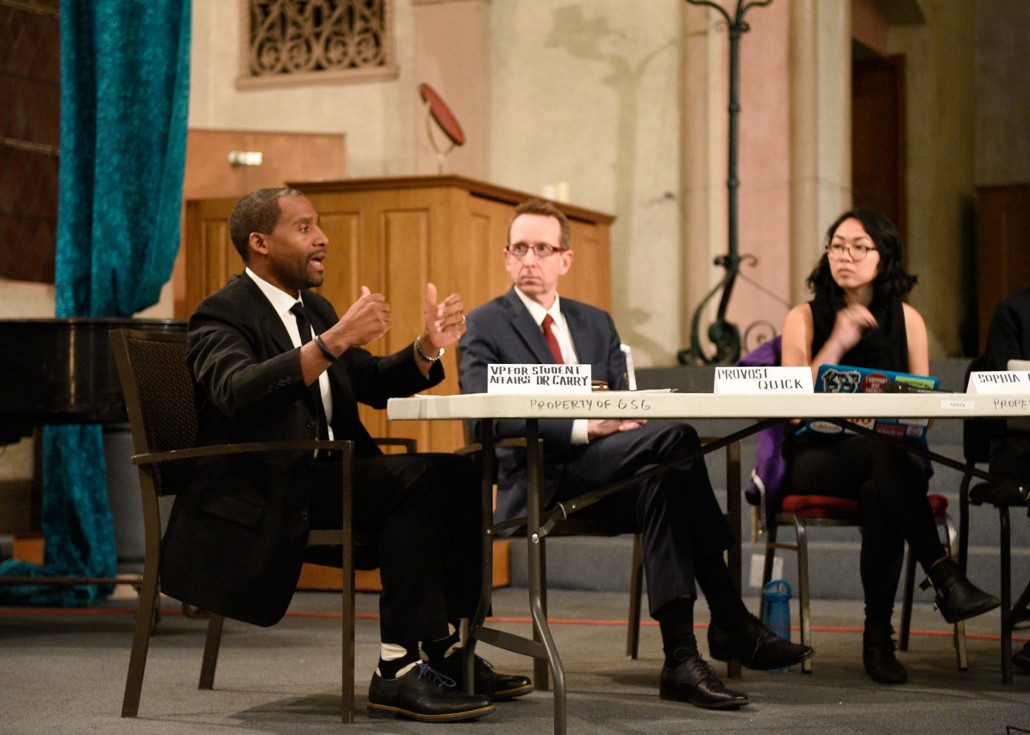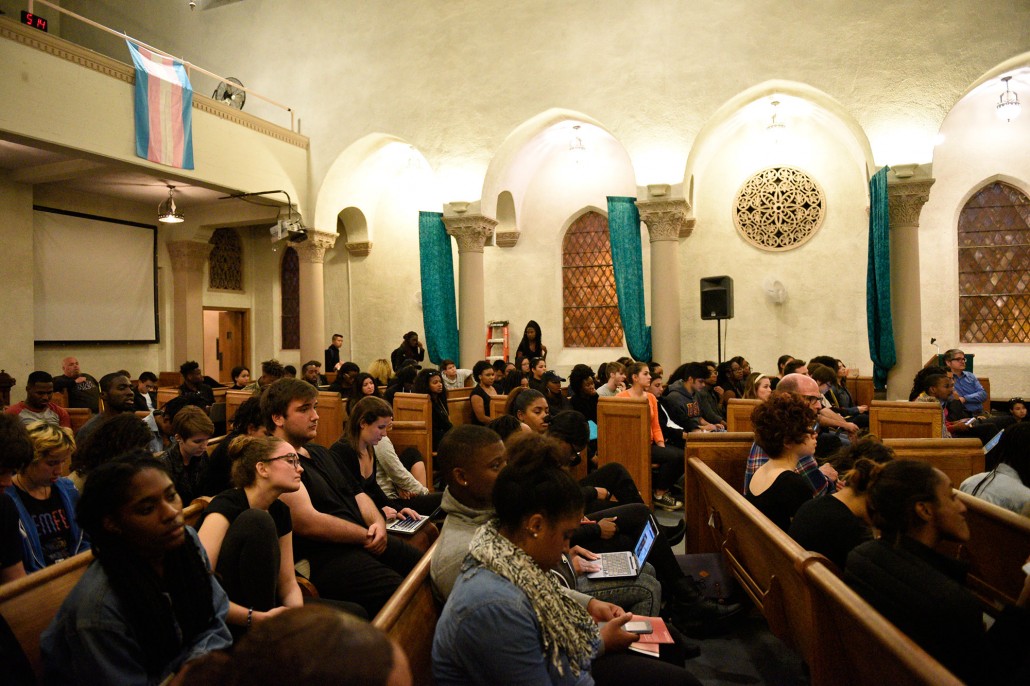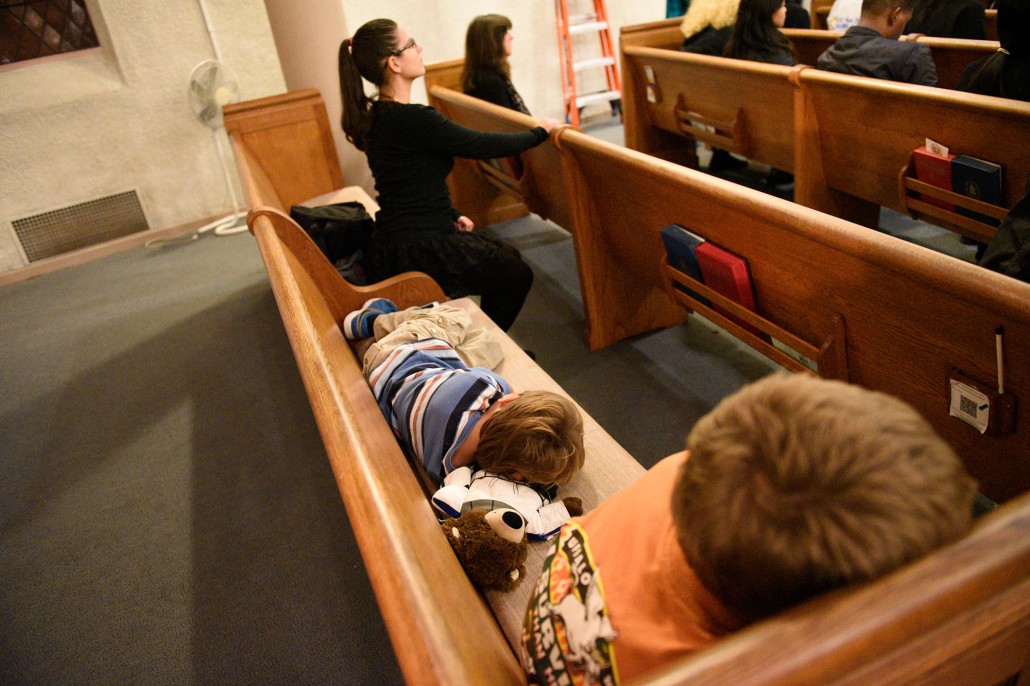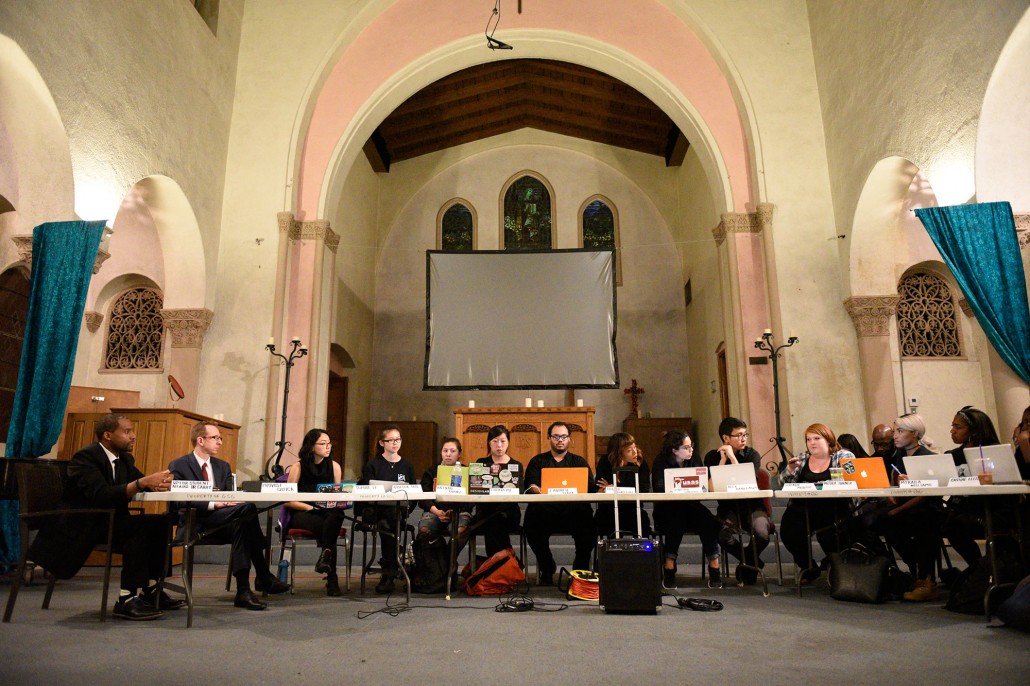Students, administrators discuss campus climate resolution
Following protests on campus earlier in the day, student leaders and key authors of the campus climate resolution passed by the Undergraduate Student Government on Tuesday met with Vice President for Student Affairs Ainsley Carry and Provost Michael Quick at an open forum Thursday evening in the United University Church.
“I’m the highest ranking academic officer at this University,” Quick said. “This is the most critical academic issue of our time. I’m accountable.”
Issues of race and discrimination are roiling college campuses across the nation. At noon, a rally was held on campus in solidarity with the students of the University of Missouri, which escalated when protesters moved to Bovard Auditorium, demanding that Quick come out and speak to students. Carry told those assembled that the provost would be available at 4:30 p.m. Later in the day, organizers of the rally announced that the forum would be held in the UUC.
Mykaila Williams, executive director of the Black Student Assembly, and Moira Turner, director of USG Diversity Affairs both gave statements at the beginning of the forum, with Turner’s directed to President C. L. Max Nikias and Quick.
In her statement, Williams noted the unrest at both Mizzou and other campuses and the role that student activists have played.
“The recent victories at the University of Missouri including the resignation of their president remind us all that we can make a difference and that we should continue striving to hold university leaders accountable when they are indifferent to the issues affecting their students,” she said.
Turner noted examples of racism at USC’s campuses, including an incident in May 2013 where LAPD officers in riot gear responded to a party held by black students, which she said the administration refused to acknowledge as racially motivated. She also cited an incident in February 2014 where a flier was mailed to the office of the Asian Pacific American Student Services, which she said the administration dismissed citing the diversity at USC.
“The events that are occurring at Mizzou are reflective of a larger issue present on college campuses nationally,” Turner said. “As students united we demand resources, not reports. We demand a culture of care, not of compliance. As students united we demand that you, President Nikias and Provost Quick, adopt the campus climate resolution and work with us to reach a strategic plan to achieve these goals listed in the resolution by the end of the year.”
Quick said that diversity was one of his foremost priorities as provost, noting that he hired three women of color to his office when he assumed the position in April.
“Diversity, inclusion, access and opportunity is one of the wicked problems of our time,” Quick said.
Quick said that he had read the resolution and that he was working with his team and the administration to formulate a University response that has action items around the issue, which he hoped would be released “very shortly.”
Carry said that one problem was communication between students and the administration. He said that numerous conversations have taken place regarding issues of diversity, but the administration has not done enough to communicate the work being done.
“We haven’t updated students, and that’s my bad,” Carry said.
Carry said he didn’t think any of the requests in the resolution were “unreasonable” and that he was committed to a continuing dialogue. Carry and Quick agreed to have biweekly meetings with the resolution authors to discuss its implementation.
The discussion then moved to specific provisions in the resolution, specifically the hiring of a vice president for diversity, equity and inclusion. Quick said there could be an issue with consolidating the responsibility entirely under one person and that the different schools should have some flexibility. Turner responded saying that the resolution includes the hiring of a vice dean for each of the schools and that having a single administrator responsible would increase accountability and the resources available to students.
Students also asked that specific administrators be appointed to deal with the provisions of the resolution. Carry and Quick said that they would be responsible for the whole resolution and that they would be happy to meet next week to assign specific administrators to address the various provisions.
The next provision discussed was the hiring of an additional Title IX investigator. Carry said that the Office of Equity and Diversity has 12 people working in it, with eight assigned to deal with faculty cases and four to student cases. Carry said that the allocation could change to six and six.
Shyann Murphy, executive director of the Women’s Student Assembly, said that USC has yet to name a Title IX Coordinator since the former coordinator, Jody Shipper left. Murphy said that in the interim, Kegan Allee has been both the Title IX coordinator and investigator, which has led to some cases taking six to eight months to resolve, rather than the federally suggested two months.
Carry said that the new Title IX coordinator would be responsible for making staffing changes. He said the search for Shipper’s replacement is ongoing, but that he is committed to reducing the wait time to 60 days. Carry said he hoped to have the position filled by the end of the semester.
Turner then mentioned the difficulty students had accessing high-level administrators. Quick said he made a concerted effort to make himself available.
“Within two hours of you asking for this meeting, I’m here,” he said.
Carry and Quick agreed to hold more open forums and to both hold office hours.
Carry also agreed that the University could do more to increase transparency with bias reports, including releasing a summary of the data at the end of each semester.
The conversation moved to the provision of the resolution regarding diversity in course curricula and diversity training for students and faculty. Quick said that students should meet with the Academic Senate because faculty are given a great deal of autonomy to decide their curriculum.
“We give a lot of freedom to faculty to design how they teach,” Quick said.
The final topic discussed was the issue of cultural resource centers being understaffed and under resourced. Students said that such centers should not be places where students merely receive information and paperwork, but also spaces for them to gather.
Carry said that he was looking into spaces in the Ronald Tutor Campus Center for cultural resource centers, most of which are currently in the Student Union.
Turner asked if Carry would commit to having space allocated in the new University Village. Carry said that he was open to continuing conversation, but since the Village would only be completed in Fall 2017, the campus center was the most viable space in the interim. Carry also said that he would be open to revisiting the repurposing of the Innovation Lab, currently in the Student Union, which was being considered as an expansion for the LGBT Resource Center.
Quick commended the students who organized the forum.
“What I’m so impressed with, is that students are passionate about this issue, as they should be, that they want to work with the administration, they want to work with faculty to figure this out,” Quick said in an interview with the Daily Trojan. “It’s not just about making symbolic gestures, people are really ready to roll up their sleeves and work, as this University should, to figure these things out.”
Turner said that, overall, she thought the meeting went well but she hopes that the meeting will translate into tangible action from the University.
“I think it went OK, I think we can do better, but I am [optimistic], and I’m looking forward to our meeting on the 23rd,” she said.

